Report: Entrepreneurship and Small Business Management (Unit 9)
VerifiedAdded on 2023/01/09
|13
|3931
|26
Report
AI Summary
This report delves into the multifaceted world of entrepreneurship and small business management. It begins by defining entrepreneurship and examining various venture types, including private, public, and voluntary companies, along with their characteristics and operational models. The report then explores the similarities and differences between these ventures, considering factors such as size, scope, and objectives. It further analyzes the impact of micro and small businesses on the economy, highlighting their role in GDP growth and employment generation. The importance of small businesses and start-ups for social and economic growth is also discussed, emphasizing their contribution to local employment and increased competition. The report also identifies the characteristic traits and skills of successful entrepreneurs, differentiating them from business managers, and examines the aspects of entrepreneurial personality, reflecting their motivation and mindset. Finally, it explores how background and experience can either foster or hinder entrepreneurship, providing a comprehensive overview of the entrepreneurial landscape.

ENTREPRENURSHIP AND
SMALL BUSINESS
MANAGEMENT
SMALL BUSINESS
MANAGEMENT
Paraphrase This Document
Need a fresh take? Get an instant paraphrase of this document with our AI Paraphraser
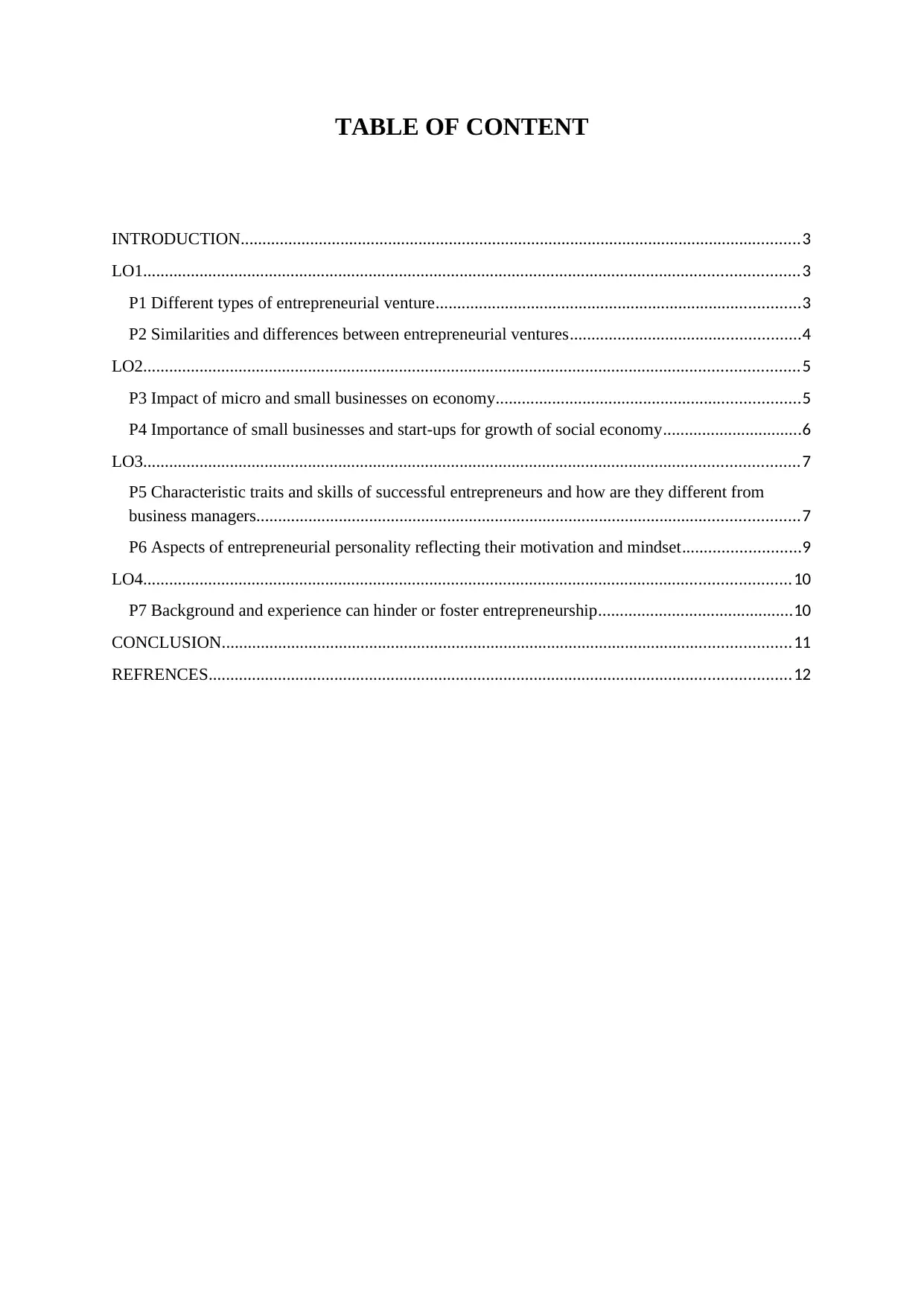
TABLE OF CONTENT
INTRODUCTION.................................................................................................................................3
LO1.......................................................................................................................................................3
P1 Different types of entrepreneurial venture....................................................................................3
P2 Similarities and differences between entrepreneurial ventures.....................................................4
LO2.......................................................................................................................................................5
P3 Impact of micro and small businesses on economy......................................................................5
P4 Importance of small businesses and start-ups for growth of social economy................................6
LO3.......................................................................................................................................................7
P5 Characteristic traits and skills of successful entrepreneurs and how are they different from
business managers.............................................................................................................................7
P6 Aspects of entrepreneurial personality reflecting their motivation and mindset...........................9
LO4.....................................................................................................................................................10
P7 Background and experience can hinder or foster entrepreneurship.............................................10
CONCLUSION...................................................................................................................................11
REFRENCES......................................................................................................................................12
INTRODUCTION.................................................................................................................................3
LO1.......................................................................................................................................................3
P1 Different types of entrepreneurial venture....................................................................................3
P2 Similarities and differences between entrepreneurial ventures.....................................................4
LO2.......................................................................................................................................................5
P3 Impact of micro and small businesses on economy......................................................................5
P4 Importance of small businesses and start-ups for growth of social economy................................6
LO3.......................................................................................................................................................7
P5 Characteristic traits and skills of successful entrepreneurs and how are they different from
business managers.............................................................................................................................7
P6 Aspects of entrepreneurial personality reflecting their motivation and mindset...........................9
LO4.....................................................................................................................................................10
P7 Background and experience can hinder or foster entrepreneurship.............................................10
CONCLUSION...................................................................................................................................11
REFRENCES......................................................................................................................................12
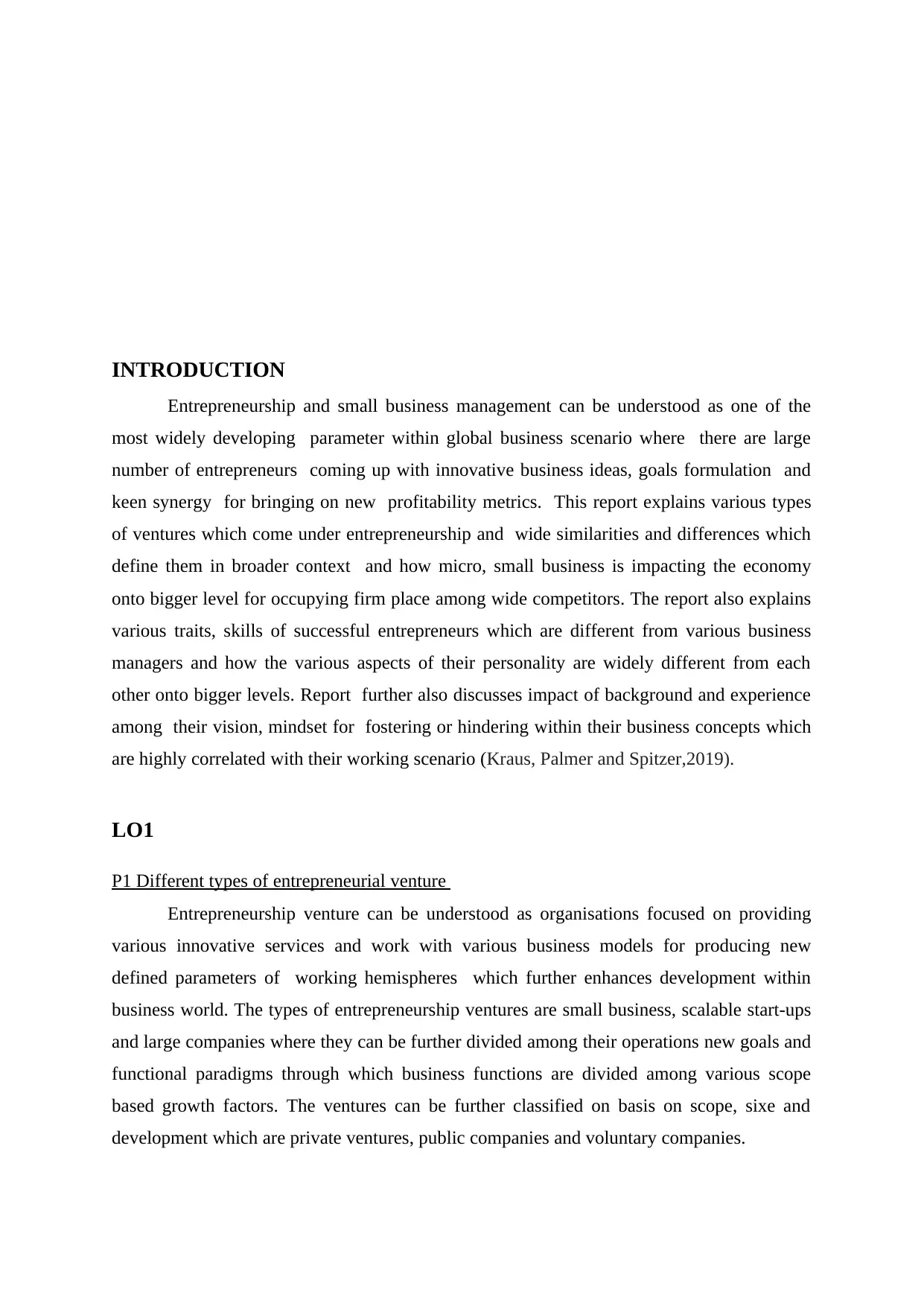
INTRODUCTION
Entrepreneurship and small business management can be understood as one of the
most widely developing parameter within global business scenario where there are large
number of entrepreneurs coming up with innovative business ideas, goals formulation and
keen synergy for bringing on new profitability metrics. This report explains various types
of ventures which come under entrepreneurship and wide similarities and differences which
define them in broader context and how micro, small business is impacting the economy
onto bigger level for occupying firm place among wide competitors. The report also explains
various traits, skills of successful entrepreneurs which are different from various business
managers and how the various aspects of their personality are widely different from each
other onto bigger levels. Report further also discusses impact of background and experience
among their vision, mindset for fostering or hindering within their business concepts which
are highly correlated with their working scenario (Kraus, Palmer and Spitzer,2019).
LO1
P1 Different types of entrepreneurial venture
Entrepreneurship venture can be understood as organisations focused on providing
various innovative services and work with various business models for producing new
defined parameters of working hemispheres which further enhances development within
business world. The types of entrepreneurship ventures are small business, scalable start-ups
and large companies where they can be further divided among their operations new goals and
functional paradigms through which business functions are divided among various scope
based growth factors. The ventures can be further classified on basis on scope, sixe and
development which are private ventures, public companies and voluntary companies.
Entrepreneurship and small business management can be understood as one of the
most widely developing parameter within global business scenario where there are large
number of entrepreneurs coming up with innovative business ideas, goals formulation and
keen synergy for bringing on new profitability metrics. This report explains various types
of ventures which come under entrepreneurship and wide similarities and differences which
define them in broader context and how micro, small business is impacting the economy
onto bigger level for occupying firm place among wide competitors. The report also explains
various traits, skills of successful entrepreneurs which are different from various business
managers and how the various aspects of their personality are widely different from each
other onto bigger levels. Report further also discusses impact of background and experience
among their vision, mindset for fostering or hindering within their business concepts which
are highly correlated with their working scenario (Kraus, Palmer and Spitzer,2019).
LO1
P1 Different types of entrepreneurial venture
Entrepreneurship venture can be understood as organisations focused on providing
various innovative services and work with various business models for producing new
defined parameters of working hemispheres which further enhances development within
business world. The types of entrepreneurship ventures are small business, scalable start-ups
and large companies where they can be further divided among their operations new goals and
functional paradigms through which business functions are divided among various scope
based growth factors. The ventures can be further classified on basis on scope, sixe and
development which are private ventures, public companies and voluntary companies.
⊘ This is a preview!⊘
Do you want full access?
Subscribe today to unlock all pages.

Trusted by 1+ million students worldwide
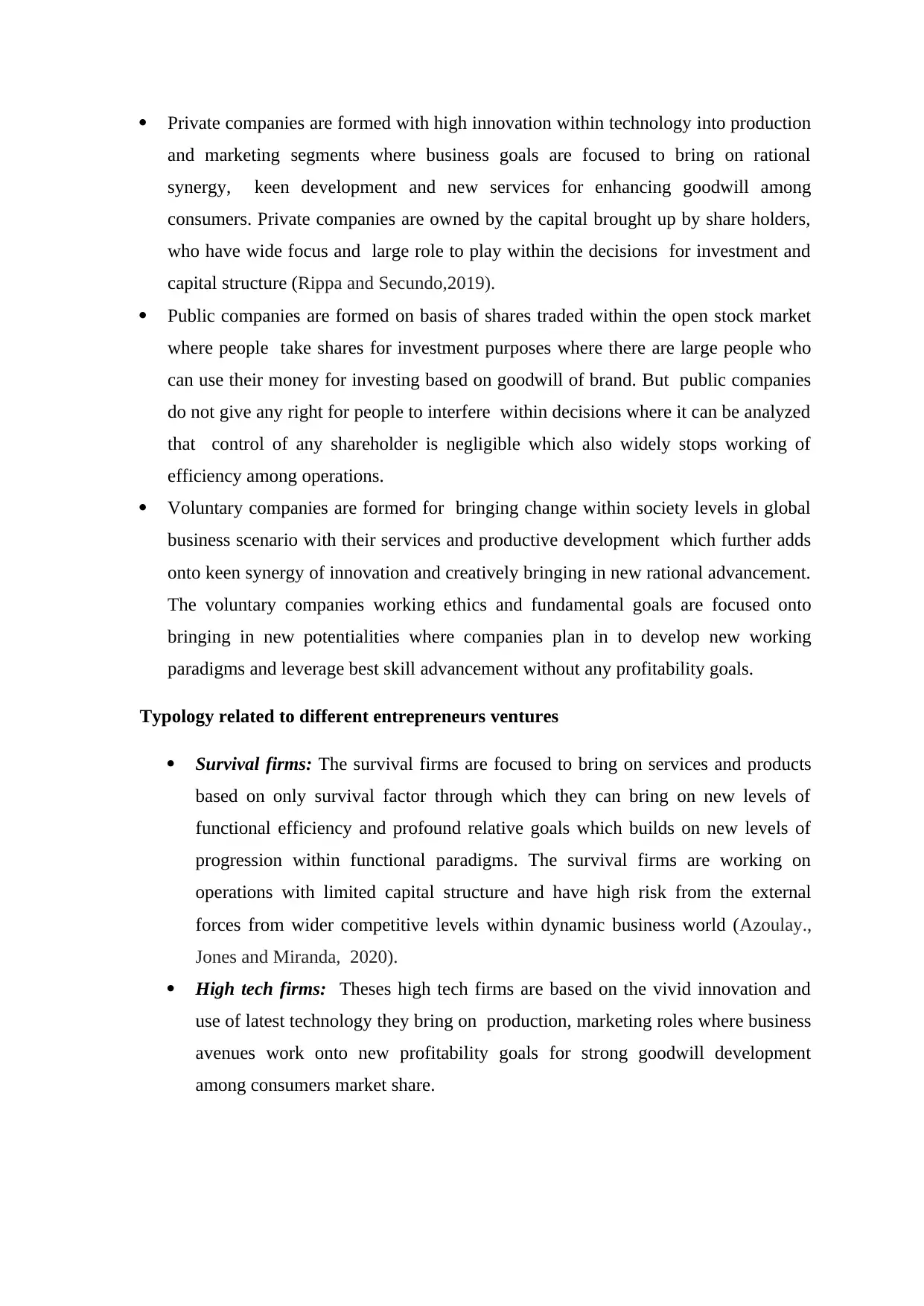
Private companies are formed with high innovation within technology into production
and marketing segments where business goals are focused to bring on rational
synergy, keen development and new services for enhancing goodwill among
consumers. Private companies are owned by the capital brought up by share holders,
who have wide focus and large role to play within the decisions for investment and
capital structure (Rippa and Secundo,2019).
Public companies are formed on basis of shares traded within the open stock market
where people take shares for investment purposes where there are large people who
can use their money for investing based on goodwill of brand. But public companies
do not give any right for people to interfere within decisions where it can be analyzed
that control of any shareholder is negligible which also widely stops working of
efficiency among operations.
Voluntary companies are formed for bringing change within society levels in global
business scenario with their services and productive development which further adds
onto keen synergy of innovation and creatively bringing in new rational advancement.
The voluntary companies working ethics and fundamental goals are focused onto
bringing in new potentialities where companies plan in to develop new working
paradigms and leverage best skill advancement without any profitability goals.
Typology related to different entrepreneurs ventures
Survival firms: The survival firms are focused to bring on services and products
based on only survival factor through which they can bring on new levels of
functional efficiency and profound relative goals which builds on new levels of
progression within functional paradigms. The survival firms are working on
operations with limited capital structure and have high risk from the external
forces from wider competitive levels within dynamic business world (Azoulay.,
Jones and Miranda, 2020).
High tech firms: Theses high tech firms are based on the vivid innovation and
use of latest technology they bring on production, marketing roles where business
avenues work onto new profitability goals for strong goodwill development
among consumers market share.
and marketing segments where business goals are focused to bring on rational
synergy, keen development and new services for enhancing goodwill among
consumers. Private companies are owned by the capital brought up by share holders,
who have wide focus and large role to play within the decisions for investment and
capital structure (Rippa and Secundo,2019).
Public companies are formed on basis of shares traded within the open stock market
where people take shares for investment purposes where there are large people who
can use their money for investing based on goodwill of brand. But public companies
do not give any right for people to interfere within decisions where it can be analyzed
that control of any shareholder is negligible which also widely stops working of
efficiency among operations.
Voluntary companies are formed for bringing change within society levels in global
business scenario with their services and productive development which further adds
onto keen synergy of innovation and creatively bringing in new rational advancement.
The voluntary companies working ethics and fundamental goals are focused onto
bringing in new potentialities where companies plan in to develop new working
paradigms and leverage best skill advancement without any profitability goals.
Typology related to different entrepreneurs ventures
Survival firms: The survival firms are focused to bring on services and products
based on only survival factor through which they can bring on new levels of
functional efficiency and profound relative goals which builds on new levels of
progression within functional paradigms. The survival firms are working on
operations with limited capital structure and have high risk from the external
forces from wider competitive levels within dynamic business world (Azoulay.,
Jones and Miranda, 2020).
High tech firms: Theses high tech firms are based on the vivid innovation and
use of latest technology they bring on production, marketing roles where business
avenues work onto new profitability goals for strong goodwill development
among consumers market share.
Paraphrase This Document
Need a fresh take? Get an instant paraphrase of this document with our AI Paraphraser
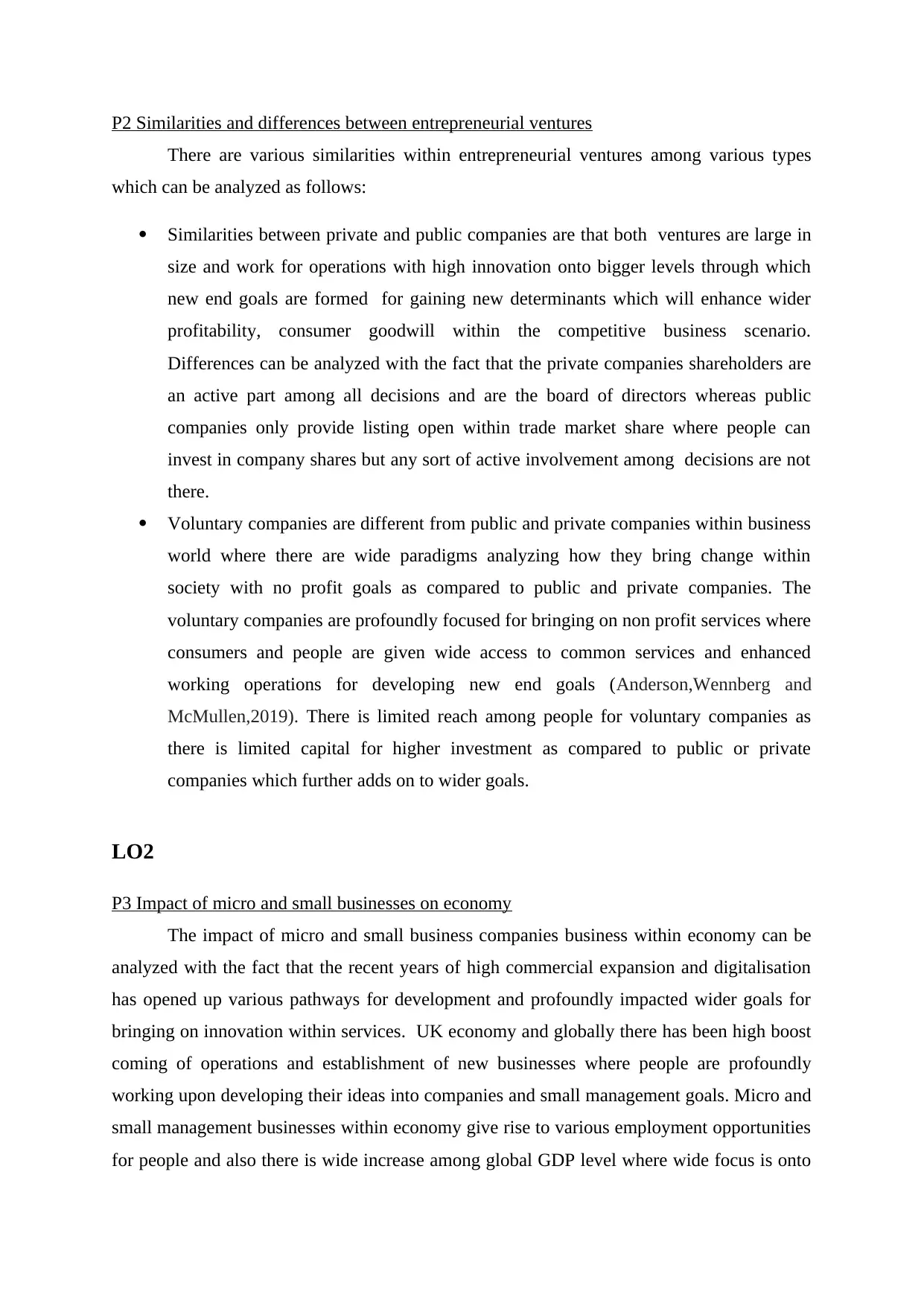
P2 Similarities and differences between entrepreneurial ventures
There are various similarities within entrepreneurial ventures among various types
which can be analyzed as follows:
Similarities between private and public companies are that both ventures are large in
size and work for operations with high innovation onto bigger levels through which
new end goals are formed for gaining new determinants which will enhance wider
profitability, consumer goodwill within the competitive business scenario.
Differences can be analyzed with the fact that the private companies shareholders are
an active part among all decisions and are the board of directors whereas public
companies only provide listing open within trade market share where people can
invest in company shares but any sort of active involvement among decisions are not
there.
Voluntary companies are different from public and private companies within business
world where there are wide paradigms analyzing how they bring change within
society with no profit goals as compared to public and private companies. The
voluntary companies are profoundly focused for bringing on non profit services where
consumers and people are given wide access to common services and enhanced
working operations for developing new end goals (Anderson,Wennberg and
McMullen,2019). There is limited reach among people for voluntary companies as
there is limited capital for higher investment as compared to public or private
companies which further adds on to wider goals.
LO2
P3 Impact of micro and small businesses on economy
The impact of micro and small business companies business within economy can be
analyzed with the fact that the recent years of high commercial expansion and digitalisation
has opened up various pathways for development and profoundly impacted wider goals for
bringing on innovation within services. UK economy and globally there has been high boost
coming of operations and establishment of new businesses where people are profoundly
working upon developing their ideas into companies and small management goals. Micro and
small management businesses within economy give rise to various employment opportunities
for people and also there is wide increase among global GDP level where wide focus is onto
There are various similarities within entrepreneurial ventures among various types
which can be analyzed as follows:
Similarities between private and public companies are that both ventures are large in
size and work for operations with high innovation onto bigger levels through which
new end goals are formed for gaining new determinants which will enhance wider
profitability, consumer goodwill within the competitive business scenario.
Differences can be analyzed with the fact that the private companies shareholders are
an active part among all decisions and are the board of directors whereas public
companies only provide listing open within trade market share where people can
invest in company shares but any sort of active involvement among decisions are not
there.
Voluntary companies are different from public and private companies within business
world where there are wide paradigms analyzing how they bring change within
society with no profit goals as compared to public and private companies. The
voluntary companies are profoundly focused for bringing on non profit services where
consumers and people are given wide access to common services and enhanced
working operations for developing new end goals (Anderson,Wennberg and
McMullen,2019). There is limited reach among people for voluntary companies as
there is limited capital for higher investment as compared to public or private
companies which further adds on to wider goals.
LO2
P3 Impact of micro and small businesses on economy
The impact of micro and small business companies business within economy can be
analyzed with the fact that the recent years of high commercial expansion and digitalisation
has opened up various pathways for development and profoundly impacted wider goals for
bringing on innovation within services. UK economy and globally there has been high boost
coming of operations and establishment of new businesses where people are profoundly
working upon developing their ideas into companies and small management goals. Micro and
small management businesses within economy give rise to various employment opportunities
for people and also there is wide increase among global GDP level where wide focus is onto
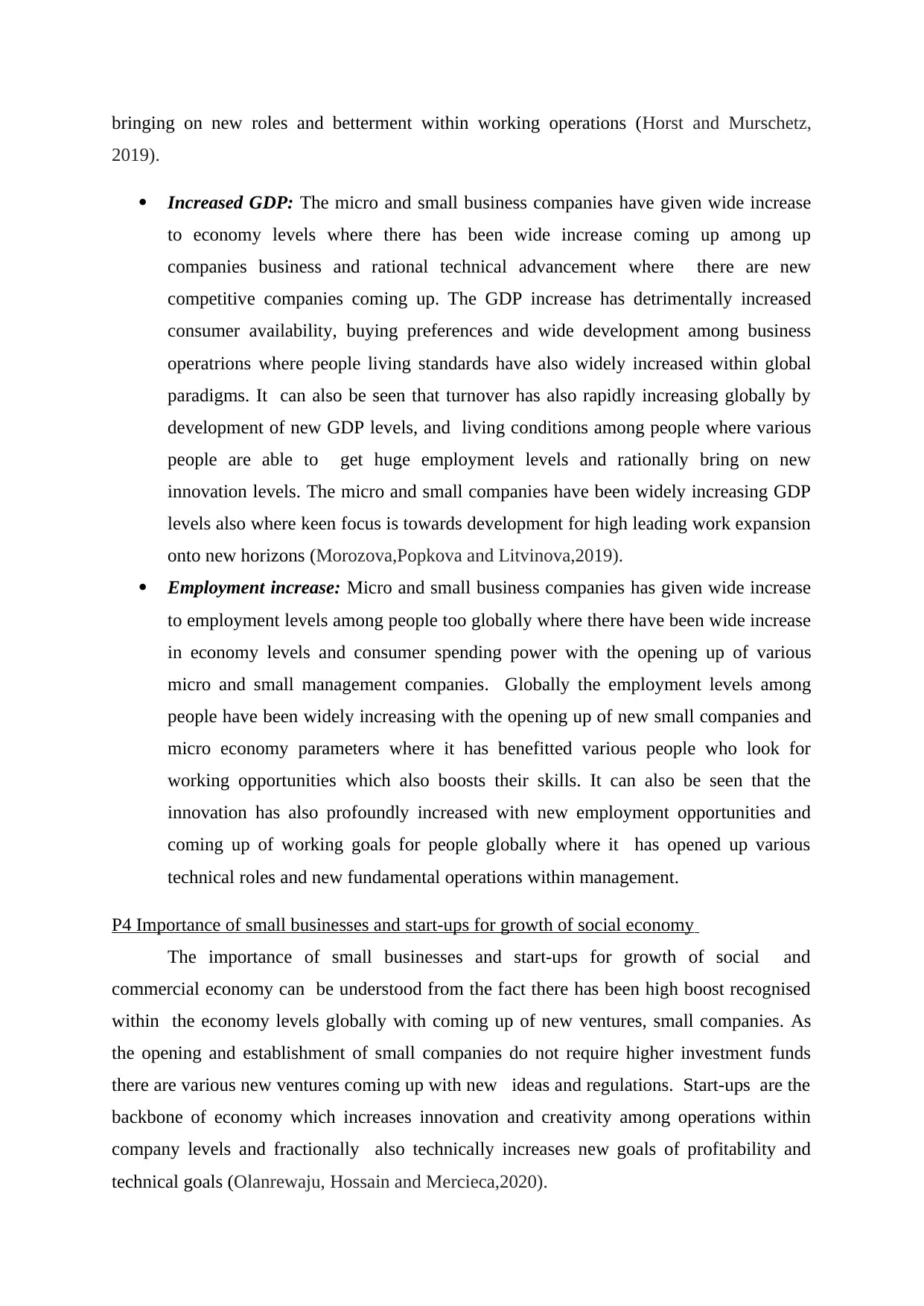
bringing on new roles and betterment within working operations (Horst and Murschetz,
2019).
Increased GDP: The micro and small business companies have given wide increase
to economy levels where there has been wide increase coming up among up
companies business and rational technical advancement where there are new
competitive companies coming up. The GDP increase has detrimentally increased
consumer availability, buying preferences and wide development among business
operatrions where people living standards have also widely increased within global
paradigms. It can also be seen that turnover has also rapidly increasing globally by
development of new GDP levels, and living conditions among people where various
people are able to get huge employment levels and rationally bring on new
innovation levels. The micro and small companies have been widely increasing GDP
levels also where keen focus is towards development for high leading work expansion
onto new horizons (Morozova,Popkova and Litvinova,2019).
Employment increase: Micro and small business companies has given wide increase
to employment levels among people too globally where there have been wide increase
in economy levels and consumer spending power with the opening up of various
micro and small management companies. Globally the employment levels among
people have been widely increasing with the opening up of new small companies and
micro economy parameters where it has benefitted various people who look for
working opportunities which also boosts their skills. It can also be seen that the
innovation has also profoundly increased with new employment opportunities and
coming up of working goals for people globally where it has opened up various
technical roles and new fundamental operations within management.
P4 Importance of small businesses and start-ups for growth of social economy
The importance of small businesses and start-ups for growth of social and
commercial economy can be understood from the fact there has been high boost recognised
within the economy levels globally with coming up of new ventures, small companies. As
the opening and establishment of small companies do not require higher investment funds
there are various new ventures coming up with new ideas and regulations. Start-ups are the
backbone of economy which increases innovation and creativity among operations within
company levels and fractionally also technically increases new goals of profitability and
technical goals (Olanrewaju, Hossain and Mercieca,2020).
2019).
Increased GDP: The micro and small business companies have given wide increase
to economy levels where there has been wide increase coming up among up
companies business and rational technical advancement where there are new
competitive companies coming up. The GDP increase has detrimentally increased
consumer availability, buying preferences and wide development among business
operatrions where people living standards have also widely increased within global
paradigms. It can also be seen that turnover has also rapidly increasing globally by
development of new GDP levels, and living conditions among people where various
people are able to get huge employment levels and rationally bring on new
innovation levels. The micro and small companies have been widely increasing GDP
levels also where keen focus is towards development for high leading work expansion
onto new horizons (Morozova,Popkova and Litvinova,2019).
Employment increase: Micro and small business companies has given wide increase
to employment levels among people too globally where there have been wide increase
in economy levels and consumer spending power with the opening up of various
micro and small management companies. Globally the employment levels among
people have been widely increasing with the opening up of new small companies and
micro economy parameters where it has benefitted various people who look for
working opportunities which also boosts their skills. It can also be seen that the
innovation has also profoundly increased with new employment opportunities and
coming up of working goals for people globally where it has opened up various
technical roles and new fundamental operations within management.
P4 Importance of small businesses and start-ups for growth of social economy
The importance of small businesses and start-ups for growth of social and
commercial economy can be understood from the fact there has been high boost recognised
within the economy levels globally with coming up of new ventures, small companies. As
the opening and establishment of small companies do not require higher investment funds
there are various new ventures coming up with new ideas and regulations. Start-ups are the
backbone of economy which increases innovation and creativity among operations within
company levels and fractionally also technically increases new goals of profitability and
technical goals (Olanrewaju, Hossain and Mercieca,2020).
⊘ This is a preview!⊘
Do you want full access?
Subscribe today to unlock all pages.

Trusted by 1+ million students worldwide
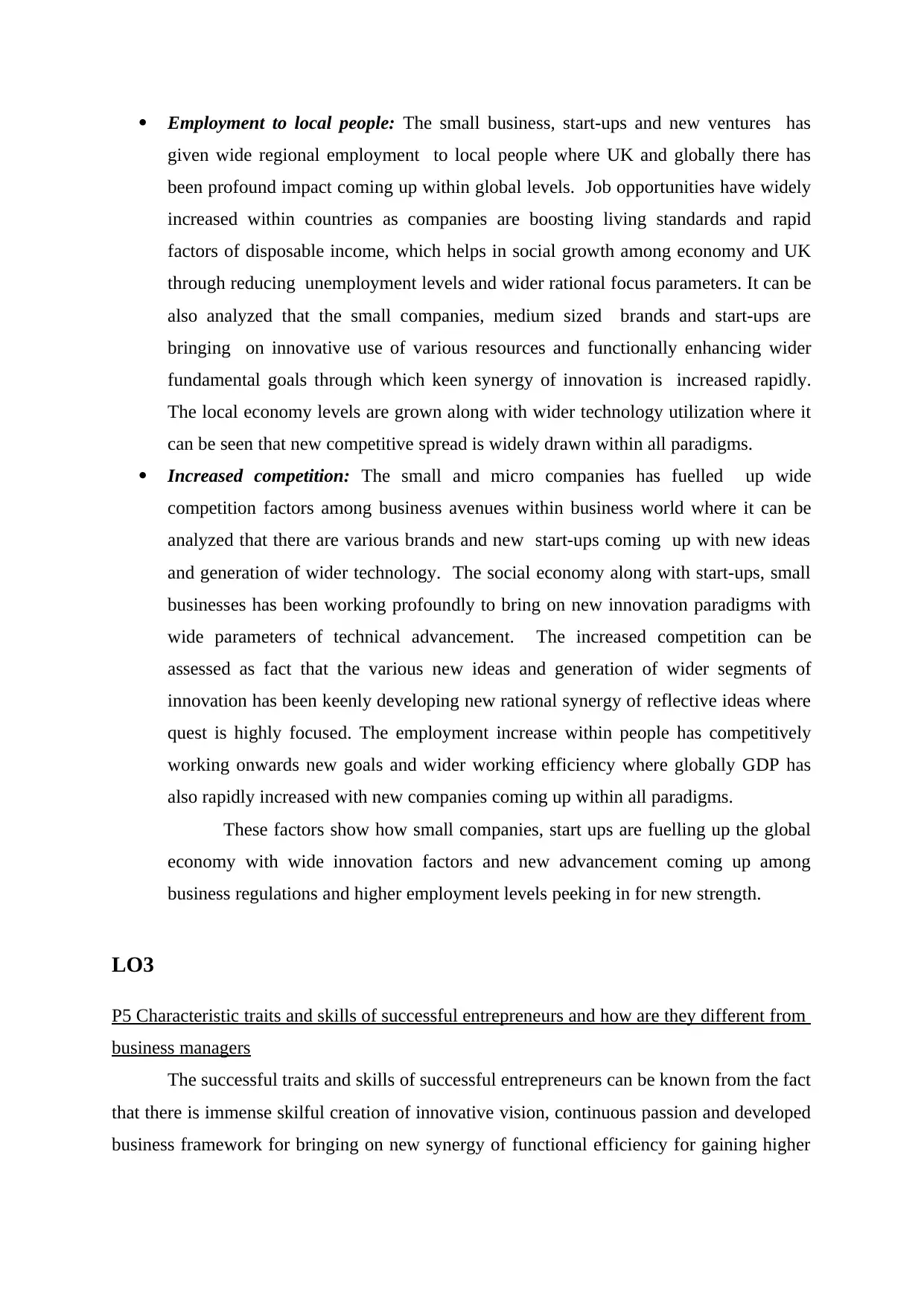
Employment to local people: The small business, start-ups and new ventures has
given wide regional employment to local people where UK and globally there has
been profound impact coming up within global levels. Job opportunities have widely
increased within countries as companies are boosting living standards and rapid
factors of disposable income, which helps in social growth among economy and UK
through reducing unemployment levels and wider rational focus parameters. It can be
also analyzed that the small companies, medium sized brands and start-ups are
bringing on innovative use of various resources and functionally enhancing wider
fundamental goals through which keen synergy of innovation is increased rapidly.
The local economy levels are grown along with wider technology utilization where it
can be seen that new competitive spread is widely drawn within all paradigms.
Increased competition: The small and micro companies has fuelled up wide
competition factors among business avenues within business world where it can be
analyzed that there are various brands and new start-ups coming up with new ideas
and generation of wider technology. The social economy along with start-ups, small
businesses has been working profoundly to bring on new innovation paradigms with
wide parameters of technical advancement. The increased competition can be
assessed as fact that the various new ideas and generation of wider segments of
innovation has been keenly developing new rational synergy of reflective ideas where
quest is highly focused. The employment increase within people has competitively
working onwards new goals and wider working efficiency where globally GDP has
also rapidly increased with new companies coming up within all paradigms.
These factors show how small companies, start ups are fuelling up the global
economy with wide innovation factors and new advancement coming up among
business regulations and higher employment levels peeking in for new strength.
LO3
P5 Characteristic traits and skills of successful entrepreneurs and how are they different from
business managers
The successful traits and skills of successful entrepreneurs can be known from the fact
that there is immense skilful creation of innovative vision, continuous passion and developed
business framework for bringing on new synergy of functional efficiency for gaining higher
given wide regional employment to local people where UK and globally there has
been profound impact coming up within global levels. Job opportunities have widely
increased within countries as companies are boosting living standards and rapid
factors of disposable income, which helps in social growth among economy and UK
through reducing unemployment levels and wider rational focus parameters. It can be
also analyzed that the small companies, medium sized brands and start-ups are
bringing on innovative use of various resources and functionally enhancing wider
fundamental goals through which keen synergy of innovation is increased rapidly.
The local economy levels are grown along with wider technology utilization where it
can be seen that new competitive spread is widely drawn within all paradigms.
Increased competition: The small and micro companies has fuelled up wide
competition factors among business avenues within business world where it can be
analyzed that there are various brands and new start-ups coming up with new ideas
and generation of wider technology. The social economy along with start-ups, small
businesses has been working profoundly to bring on new innovation paradigms with
wide parameters of technical advancement. The increased competition can be
assessed as fact that the various new ideas and generation of wider segments of
innovation has been keenly developing new rational synergy of reflective ideas where
quest is highly focused. The employment increase within people has competitively
working onwards new goals and wider working efficiency where globally GDP has
also rapidly increased with new companies coming up within all paradigms.
These factors show how small companies, start ups are fuelling up the global
economy with wide innovation factors and new advancement coming up among
business regulations and higher employment levels peeking in for new strength.
LO3
P5 Characteristic traits and skills of successful entrepreneurs and how are they different from
business managers
The successful traits and skills of successful entrepreneurs can be known from the fact
that there is immense skilful creation of innovative vision, continuous passion and developed
business framework for bringing on new synergy of functional efficiency for gaining higher
Paraphrase This Document
Need a fresh take? Get an instant paraphrase of this document with our AI Paraphraser
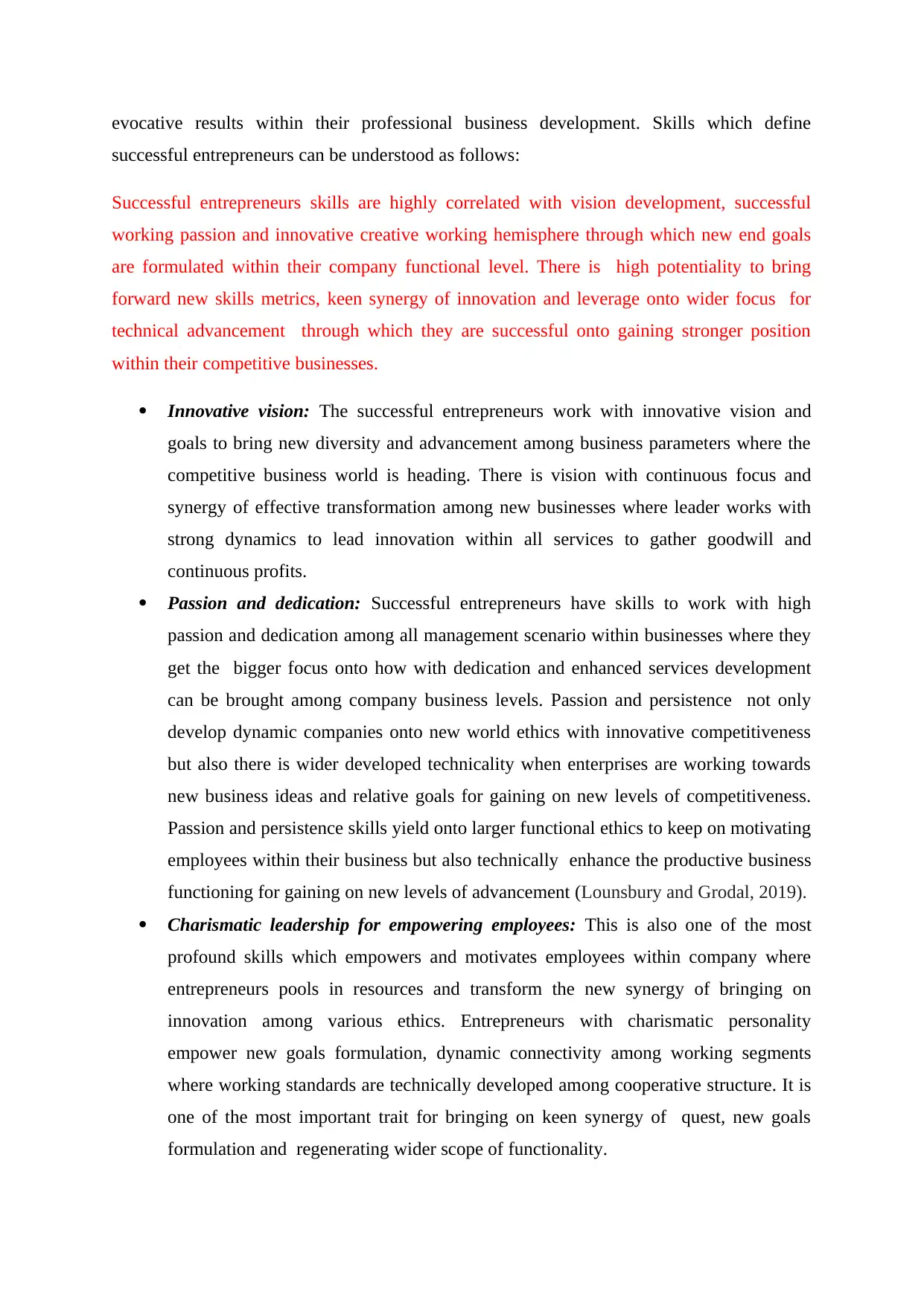
evocative results within their professional business development. Skills which define
successful entrepreneurs can be understood as follows:
Successful entrepreneurs skills are highly correlated with vision development, successful
working passion and innovative creative working hemisphere through which new end goals
are formulated within their company functional level. There is high potentiality to bring
forward new skills metrics, keen synergy of innovation and leverage onto wider focus for
technical advancement through which they are successful onto gaining stronger position
within their competitive businesses.
Innovative vision: The successful entrepreneurs work with innovative vision and
goals to bring new diversity and advancement among business parameters where the
competitive business world is heading. There is vision with continuous focus and
synergy of effective transformation among new businesses where leader works with
strong dynamics to lead innovation within all services to gather goodwill and
continuous profits.
Passion and dedication: Successful entrepreneurs have skills to work with high
passion and dedication among all management scenario within businesses where they
get the bigger focus onto how with dedication and enhanced services development
can be brought among company business levels. Passion and persistence not only
develop dynamic companies onto new world ethics with innovative competitiveness
but also there is wider developed technicality when enterprises are working towards
new business ideas and relative goals for gaining on new levels of competitiveness.
Passion and persistence skills yield onto larger functional ethics to keep on motivating
employees within their business but also technically enhance the productive business
functioning for gaining on new levels of advancement (Lounsbury and Grodal, 2019).
Charismatic leadership for empowering employees: This is also one of the most
profound skills which empowers and motivates employees within company where
entrepreneurs pools in resources and transform the new synergy of bringing on
innovation among various ethics. Entrepreneurs with charismatic personality
empower new goals formulation, dynamic connectivity among working segments
where working standards are technically developed among cooperative structure. It is
one of the most important trait for bringing on keen synergy of quest, new goals
formulation and regenerating wider scope of functionality.
successful entrepreneurs can be understood as follows:
Successful entrepreneurs skills are highly correlated with vision development, successful
working passion and innovative creative working hemisphere through which new end goals
are formulated within their company functional level. There is high potentiality to bring
forward new skills metrics, keen synergy of innovation and leverage onto wider focus for
technical advancement through which they are successful onto gaining stronger position
within their competitive businesses.
Innovative vision: The successful entrepreneurs work with innovative vision and
goals to bring new diversity and advancement among business parameters where the
competitive business world is heading. There is vision with continuous focus and
synergy of effective transformation among new businesses where leader works with
strong dynamics to lead innovation within all services to gather goodwill and
continuous profits.
Passion and dedication: Successful entrepreneurs have skills to work with high
passion and dedication among all management scenario within businesses where they
get the bigger focus onto how with dedication and enhanced services development
can be brought among company business levels. Passion and persistence not only
develop dynamic companies onto new world ethics with innovative competitiveness
but also there is wider developed technicality when enterprises are working towards
new business ideas and relative goals for gaining on new levels of competitiveness.
Passion and persistence skills yield onto larger functional ethics to keep on motivating
employees within their business but also technically enhance the productive business
functioning for gaining on new levels of advancement (Lounsbury and Grodal, 2019).
Charismatic leadership for empowering employees: This is also one of the most
profound skills which empowers and motivates employees within company where
entrepreneurs pools in resources and transform the new synergy of bringing on
innovation among various ethics. Entrepreneurs with charismatic personality
empower new goals formulation, dynamic connectivity among working segments
where working standards are technically developed among cooperative structure. It is
one of the most important trait for bringing on keen synergy of quest, new goals
formulation and regenerating wider scope of functionality.
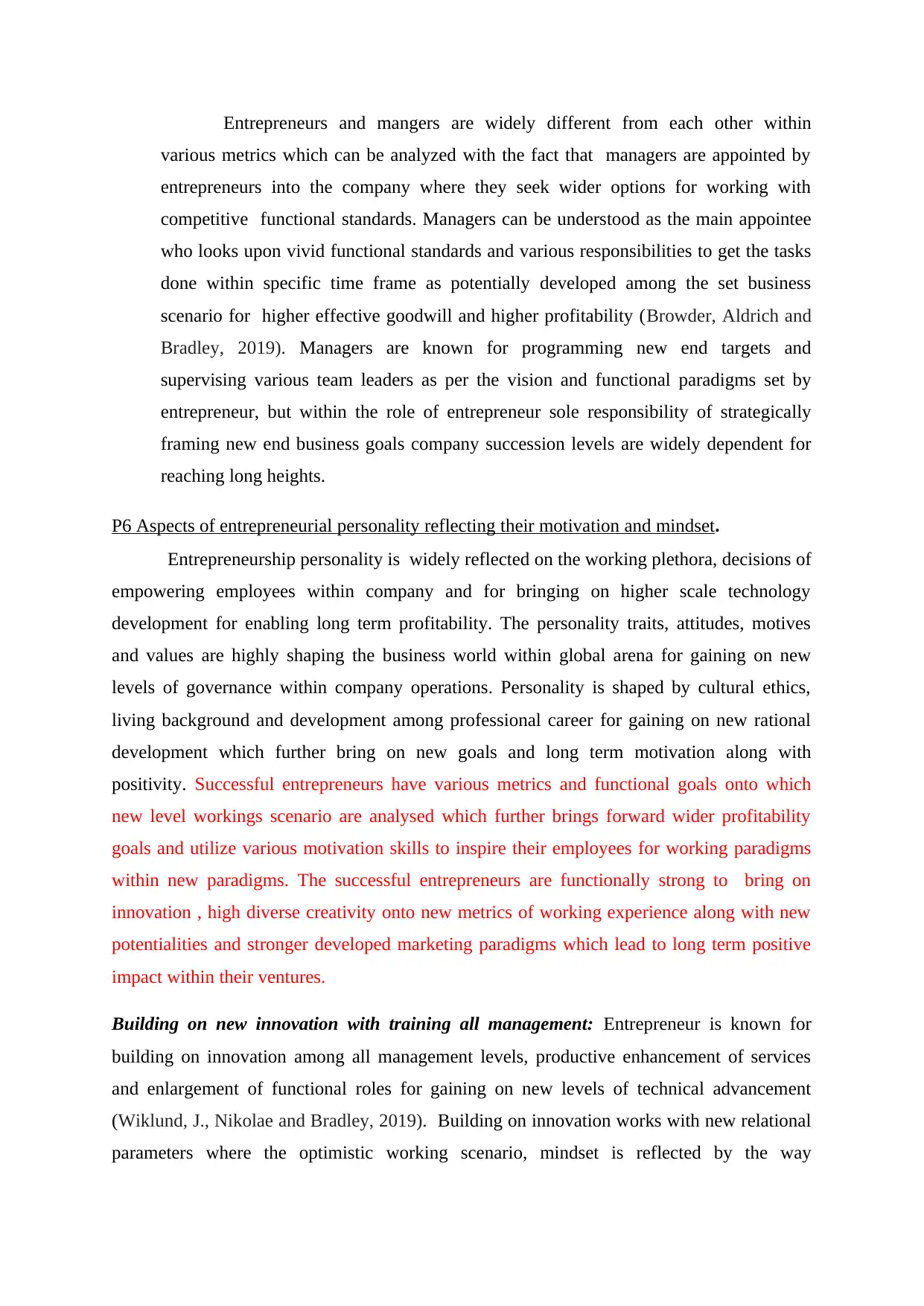
Entrepreneurs and mangers are widely different from each other within
various metrics which can be analyzed with the fact that managers are appointed by
entrepreneurs into the company where they seek wider options for working with
competitive functional standards. Managers can be understood as the main appointee
who looks upon vivid functional standards and various responsibilities to get the tasks
done within specific time frame as potentially developed among the set business
scenario for higher effective goodwill and higher profitability (Browder, Aldrich and
Bradley, 2019). Managers are known for programming new end targets and
supervising various team leaders as per the vision and functional paradigms set by
entrepreneur, but within the role of entrepreneur sole responsibility of strategically
framing new end business goals company succession levels are widely dependent for
reaching long heights.
P6 Aspects of entrepreneurial personality reflecting their motivation and mindset.
Entrepreneurship personality is widely reflected on the working plethora, decisions of
empowering employees within company and for bringing on higher scale technology
development for enabling long term profitability. The personality traits, attitudes, motives
and values are highly shaping the business world within global arena for gaining on new
levels of governance within company operations. Personality is shaped by cultural ethics,
living background and development among professional career for gaining on new rational
development which further bring on new goals and long term motivation along with
positivity. Successful entrepreneurs have various metrics and functional goals onto which
new level workings scenario are analysed which further brings forward wider profitability
goals and utilize various motivation skills to inspire their employees for working paradigms
within new paradigms. The successful entrepreneurs are functionally strong to bring on
innovation , high diverse creativity onto new metrics of working experience along with new
potentialities and stronger developed marketing paradigms which lead to long term positive
impact within their ventures.
Building on new innovation with training all management: Entrepreneur is known for
building on innovation among all management levels, productive enhancement of services
and enlargement of functional roles for gaining on new levels of technical advancement
(Wiklund, J., Nikolae and Bradley, 2019). Building on innovation works with new relational
parameters where the optimistic working scenario, mindset is reflected by the way
various metrics which can be analyzed with the fact that managers are appointed by
entrepreneurs into the company where they seek wider options for working with
competitive functional standards. Managers can be understood as the main appointee
who looks upon vivid functional standards and various responsibilities to get the tasks
done within specific time frame as potentially developed among the set business
scenario for higher effective goodwill and higher profitability (Browder, Aldrich and
Bradley, 2019). Managers are known for programming new end targets and
supervising various team leaders as per the vision and functional paradigms set by
entrepreneur, but within the role of entrepreneur sole responsibility of strategically
framing new end business goals company succession levels are widely dependent for
reaching long heights.
P6 Aspects of entrepreneurial personality reflecting their motivation and mindset.
Entrepreneurship personality is widely reflected on the working plethora, decisions of
empowering employees within company and for bringing on higher scale technology
development for enabling long term profitability. The personality traits, attitudes, motives
and values are highly shaping the business world within global arena for gaining on new
levels of governance within company operations. Personality is shaped by cultural ethics,
living background and development among professional career for gaining on new rational
development which further bring on new goals and long term motivation along with
positivity. Successful entrepreneurs have various metrics and functional goals onto which
new level workings scenario are analysed which further brings forward wider profitability
goals and utilize various motivation skills to inspire their employees for working paradigms
within new paradigms. The successful entrepreneurs are functionally strong to bring on
innovation , high diverse creativity onto new metrics of working experience along with new
potentialities and stronger developed marketing paradigms which lead to long term positive
impact within their ventures.
Building on new innovation with training all management: Entrepreneur is known for
building on innovation among all management levels, productive enhancement of services
and enlargement of functional roles for gaining on new levels of technical advancement
(Wiklund, J., Nikolae and Bradley, 2019). Building on innovation works with new relational
parameters where the optimistic working scenario, mindset is reflected by the way
⊘ This is a preview!⊘
Do you want full access?
Subscribe today to unlock all pages.

Trusted by 1+ million students worldwide
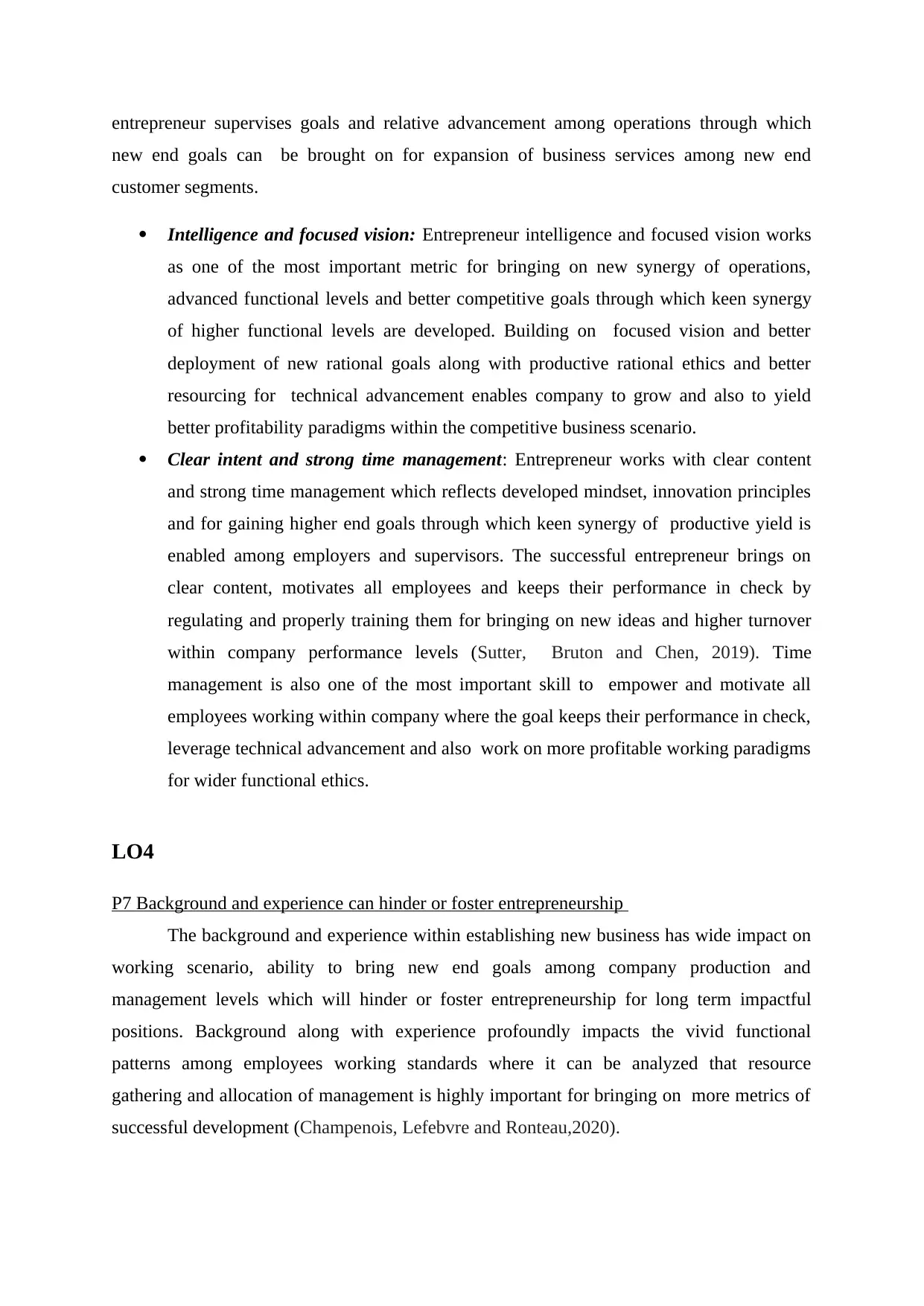
entrepreneur supervises goals and relative advancement among operations through which
new end goals can be brought on for expansion of business services among new end
customer segments.
Intelligence and focused vision: Entrepreneur intelligence and focused vision works
as one of the most important metric for bringing on new synergy of operations,
advanced functional levels and better competitive goals through which keen synergy
of higher functional levels are developed. Building on focused vision and better
deployment of new rational goals along with productive rational ethics and better
resourcing for technical advancement enables company to grow and also to yield
better profitability paradigms within the competitive business scenario.
Clear intent and strong time management: Entrepreneur works with clear content
and strong time management which reflects developed mindset, innovation principles
and for gaining higher end goals through which keen synergy of productive yield is
enabled among employers and supervisors. The successful entrepreneur brings on
clear content, motivates all employees and keeps their performance in check by
regulating and properly training them for bringing on new ideas and higher turnover
within company performance levels (Sutter, Bruton and Chen, 2019). Time
management is also one of the most important skill to empower and motivate all
employees working within company where the goal keeps their performance in check,
leverage technical advancement and also work on more profitable working paradigms
for wider functional ethics.
LO4
P7 Background and experience can hinder or foster entrepreneurship
The background and experience within establishing new business has wide impact on
working scenario, ability to bring new end goals among company production and
management levels which will hinder or foster entrepreneurship for long term impactful
positions. Background along with experience profoundly impacts the vivid functional
patterns among employees working standards where it can be analyzed that resource
gathering and allocation of management is highly important for bringing on more metrics of
successful development (Champenois, Lefebvre and Ronteau,2020).
new end goals can be brought on for expansion of business services among new end
customer segments.
Intelligence and focused vision: Entrepreneur intelligence and focused vision works
as one of the most important metric for bringing on new synergy of operations,
advanced functional levels and better competitive goals through which keen synergy
of higher functional levels are developed. Building on focused vision and better
deployment of new rational goals along with productive rational ethics and better
resourcing for technical advancement enables company to grow and also to yield
better profitability paradigms within the competitive business scenario.
Clear intent and strong time management: Entrepreneur works with clear content
and strong time management which reflects developed mindset, innovation principles
and for gaining higher end goals through which keen synergy of productive yield is
enabled among employers and supervisors. The successful entrepreneur brings on
clear content, motivates all employees and keeps their performance in check by
regulating and properly training them for bringing on new ideas and higher turnover
within company performance levels (Sutter, Bruton and Chen, 2019). Time
management is also one of the most important skill to empower and motivate all
employees working within company where the goal keeps their performance in check,
leverage technical advancement and also work on more profitable working paradigms
for wider functional ethics.
LO4
P7 Background and experience can hinder or foster entrepreneurship
The background and experience within establishing new business has wide impact on
working scenario, ability to bring new end goals among company production and
management levels which will hinder or foster entrepreneurship for long term impactful
positions. Background along with experience profoundly impacts the vivid functional
patterns among employees working standards where it can be analyzed that resource
gathering and allocation of management is highly important for bringing on more metrics of
successful development (Champenois, Lefebvre and Ronteau,2020).
Paraphrase This Document
Need a fresh take? Get an instant paraphrase of this document with our AI Paraphraser
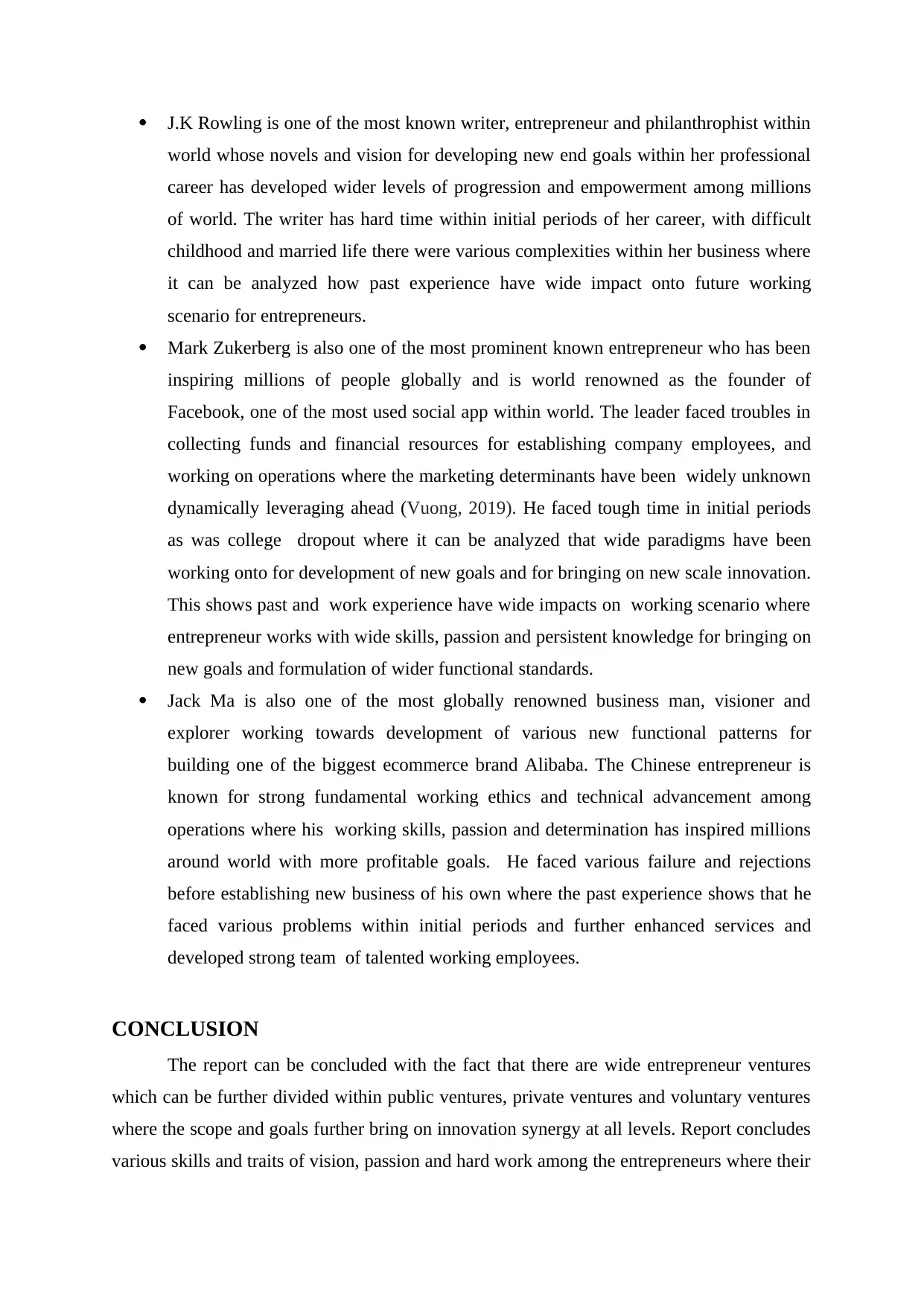
J.K Rowling is one of the most known writer, entrepreneur and philanthrophist within
world whose novels and vision for developing new end goals within her professional
career has developed wider levels of progression and empowerment among millions
of world. The writer has hard time within initial periods of her career, with difficult
childhood and married life there were various complexities within her business where
it can be analyzed how past experience have wide impact onto future working
scenario for entrepreneurs.
Mark Zukerberg is also one of the most prominent known entrepreneur who has been
inspiring millions of people globally and is world renowned as the founder of
Facebook, one of the most used social app within world. The leader faced troubles in
collecting funds and financial resources for establishing company employees, and
working on operations where the marketing determinants have been widely unknown
dynamically leveraging ahead (Vuong, 2019). He faced tough time in initial periods
as was college dropout where it can be analyzed that wide paradigms have been
working onto for development of new goals and for bringing on new scale innovation.
This shows past and work experience have wide impacts on working scenario where
entrepreneur works with wide skills, passion and persistent knowledge for bringing on
new goals and formulation of wider functional standards.
Jack Ma is also one of the most globally renowned business man, visioner and
explorer working towards development of various new functional patterns for
building one of the biggest ecommerce brand Alibaba. The Chinese entrepreneur is
known for strong fundamental working ethics and technical advancement among
operations where his working skills, passion and determination has inspired millions
around world with more profitable goals. He faced various failure and rejections
before establishing new business of his own where the past experience shows that he
faced various problems within initial periods and further enhanced services and
developed strong team of talented working employees.
CONCLUSION
The report can be concluded with the fact that there are wide entrepreneur ventures
which can be further divided within public ventures, private ventures and voluntary ventures
where the scope and goals further bring on innovation synergy at all levels. Report concludes
various skills and traits of vision, passion and hard work among the entrepreneurs where their
world whose novels and vision for developing new end goals within her professional
career has developed wider levels of progression and empowerment among millions
of world. The writer has hard time within initial periods of her career, with difficult
childhood and married life there were various complexities within her business where
it can be analyzed how past experience have wide impact onto future working
scenario for entrepreneurs.
Mark Zukerberg is also one of the most prominent known entrepreneur who has been
inspiring millions of people globally and is world renowned as the founder of
Facebook, one of the most used social app within world. The leader faced troubles in
collecting funds and financial resources for establishing company employees, and
working on operations where the marketing determinants have been widely unknown
dynamically leveraging ahead (Vuong, 2019). He faced tough time in initial periods
as was college dropout where it can be analyzed that wide paradigms have been
working onto for development of new goals and for bringing on new scale innovation.
This shows past and work experience have wide impacts on working scenario where
entrepreneur works with wide skills, passion and persistent knowledge for bringing on
new goals and formulation of wider functional standards.
Jack Ma is also one of the most globally renowned business man, visioner and
explorer working towards development of various new functional patterns for
building one of the biggest ecommerce brand Alibaba. The Chinese entrepreneur is
known for strong fundamental working ethics and technical advancement among
operations where his working skills, passion and determination has inspired millions
around world with more profitable goals. He faced various failure and rejections
before establishing new business of his own where the past experience shows that he
faced various problems within initial periods and further enhanced services and
developed strong team of talented working employees.
CONCLUSION
The report can be concluded with the fact that there are wide entrepreneur ventures
which can be further divided within public ventures, private ventures and voluntary ventures
where the scope and goals further bring on innovation synergy at all levels. Report concludes
various skills and traits of vision, passion and hard work among the entrepreneurs where their
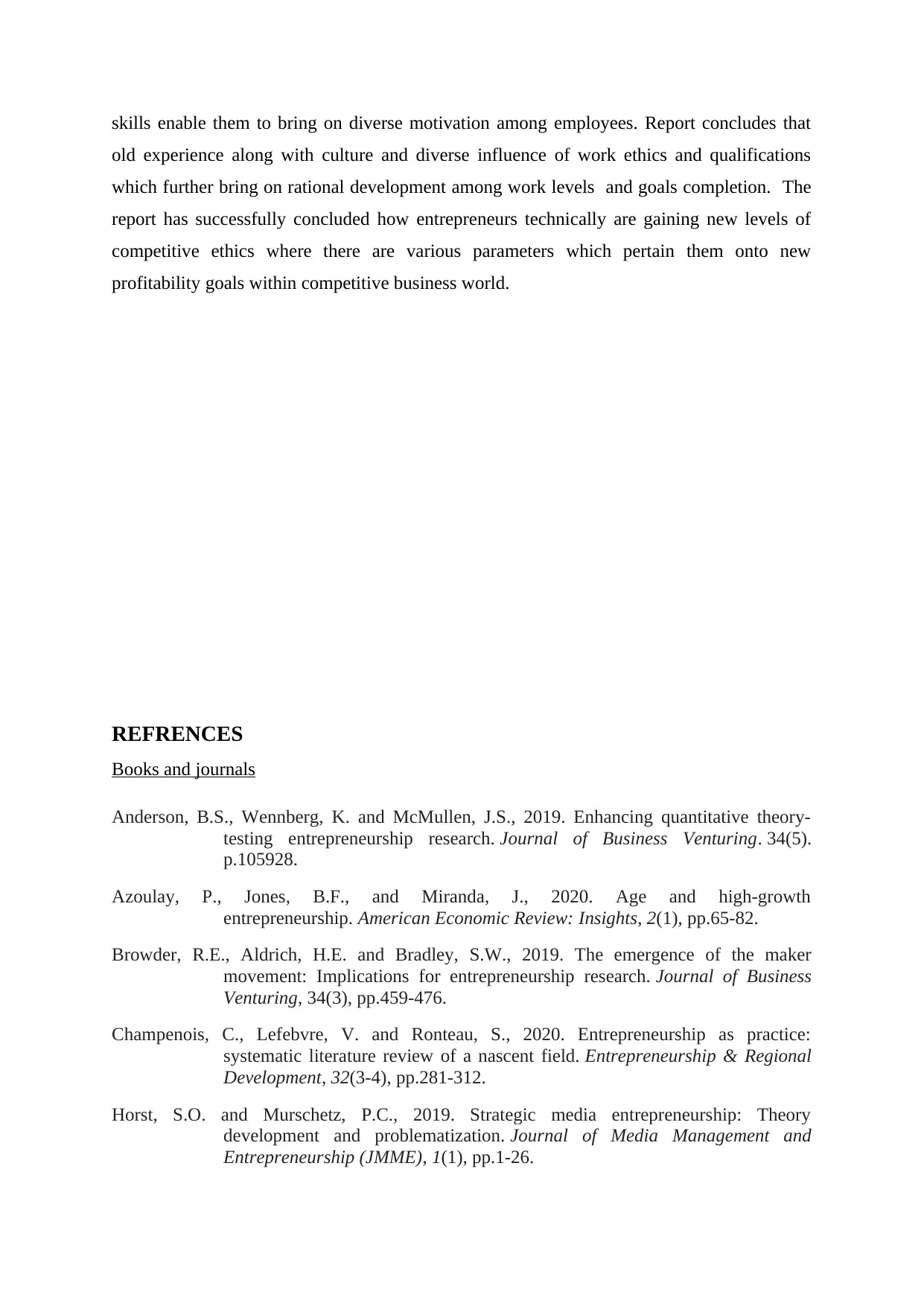
skills enable them to bring on diverse motivation among employees. Report concludes that
old experience along with culture and diverse influence of work ethics and qualifications
which further bring on rational development among work levels and goals completion. The
report has successfully concluded how entrepreneurs technically are gaining new levels of
competitive ethics where there are various parameters which pertain them onto new
profitability goals within competitive business world.
REFRENCES
Books and journals
Anderson, B.S., Wennberg, K. and McMullen, J.S., 2019. Enhancing quantitative theory-
testing entrepreneurship research. Journal of Business Venturing. 34(5).
p.105928.
Azoulay, P., Jones, B.F., and Miranda, J., 2020. Age and high-growth
entrepreneurship. American Economic Review: Insights, 2(1), pp.65-82.
Browder, R.E., Aldrich, H.E. and Bradley, S.W., 2019. The emergence of the maker
movement: Implications for entrepreneurship research. Journal of Business
Venturing, 34(3), pp.459-476.
Champenois, C., Lefebvre, V. and Ronteau, S., 2020. Entrepreneurship as practice:
systematic literature review of a nascent field. Entrepreneurship & Regional
Development, 32(3-4), pp.281-312.
Horst, S.O. and Murschetz, P.C., 2019. Strategic media entrepreneurship: Theory
development and problematization. Journal of Media Management and
Entrepreneurship (JMME), 1(1), pp.1-26.
old experience along with culture and diverse influence of work ethics and qualifications
which further bring on rational development among work levels and goals completion. The
report has successfully concluded how entrepreneurs technically are gaining new levels of
competitive ethics where there are various parameters which pertain them onto new
profitability goals within competitive business world.
REFRENCES
Books and journals
Anderson, B.S., Wennberg, K. and McMullen, J.S., 2019. Enhancing quantitative theory-
testing entrepreneurship research. Journal of Business Venturing. 34(5).
p.105928.
Azoulay, P., Jones, B.F., and Miranda, J., 2020. Age and high-growth
entrepreneurship. American Economic Review: Insights, 2(1), pp.65-82.
Browder, R.E., Aldrich, H.E. and Bradley, S.W., 2019. The emergence of the maker
movement: Implications for entrepreneurship research. Journal of Business
Venturing, 34(3), pp.459-476.
Champenois, C., Lefebvre, V. and Ronteau, S., 2020. Entrepreneurship as practice:
systematic literature review of a nascent field. Entrepreneurship & Regional
Development, 32(3-4), pp.281-312.
Horst, S.O. and Murschetz, P.C., 2019. Strategic media entrepreneurship: Theory
development and problematization. Journal of Media Management and
Entrepreneurship (JMME), 1(1), pp.1-26.
⊘ This is a preview!⊘
Do you want full access?
Subscribe today to unlock all pages.

Trusted by 1+ million students worldwide
1 out of 13
Related Documents
Your All-in-One AI-Powered Toolkit for Academic Success.
+13062052269
info@desklib.com
Available 24*7 on WhatsApp / Email
![[object Object]](/_next/static/media/star-bottom.7253800d.svg)
Unlock your academic potential
Copyright © 2020–2026 A2Z Services. All Rights Reserved. Developed and managed by ZUCOL.





